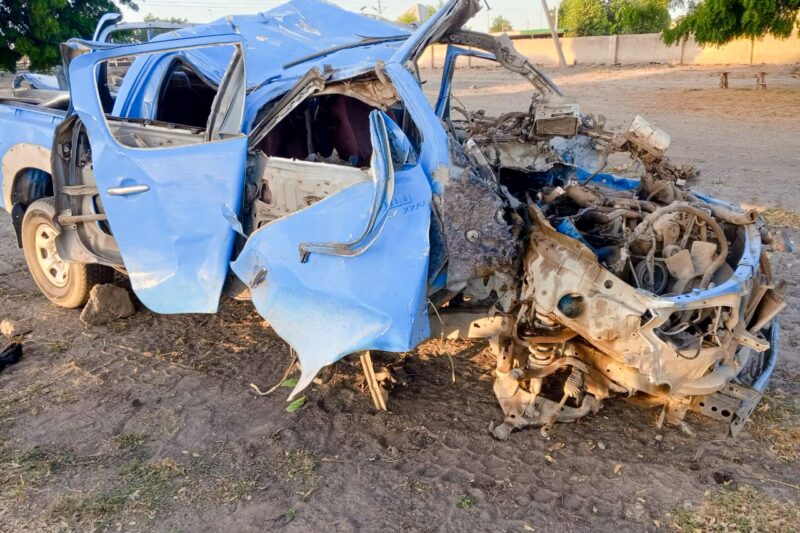The lives of 100 women in Maiduguri changed on Monday – for the better. In a collaboration between the North East Development Commission, the Borno State Ministry of Health and the Fistula Foundation in Nigeria, the women, all suffering from vesicovaginal fistula, were given the chance to have free corrective surgery at the State Specialist Hospital in Maiduguri.
Vesicovaginal fistula, also known as obstetric fistula, occurs when a woman has a prolonged, obstructed labour, but does not have access to emergency medical care, such as a cesarean section (C-section).
She often spends days in labour in excruciating pain and, according to the Fistula Foundation, tragically, her baby usually dies.
It is a serious condition but it can be corrected by surgery.
The Fistula Foundation said that during her prolonged labour, the mother’s contractions continually push the baby’s head against her pelvis. Soft tissues caught between the baby’s head and her pelvic bone become compressed, restricting the normal flow of blood.
Without adequate blood supply, sections of tissue soon die, leaving holes – known as “fistulae” – between the mother’s vagina and her bladder or rectum. It is these holes that cause incontinence. If untreated, the woman will uncontrollably leak urine, stool, or sometimes both, for the rest of her life.
The foundation said vesicovaginal fistula most commonly occurred in poor rural areas, where the affected women lived in dirt-floor dwellings and lacked access to running water and incontinence pads.
“A woman with fistula faces devastating physical and psychological consequences. Unable to control the leaking of her body’s waste, she suffers from chronic infections and pain. Too often, her smell drives away her husband, family and friends,” the foundation said.
Because fistula usually occurs during a woman’s first pregnancy – when she is in her teens or early twenties – she would likely suffer for decades if it was not repaired.
Zara Usman Malum told RNI reporter Fatima Grema Modu that she had been battling with the vesicovaginal fistula for about seven years. She said her bladder had stopped functioning well after a local midwife put salt in her vagina during the delivery of her baby.
Her condition made her feel ashamed, humiliated and depressed.
She said her husband could not bear the smell of her frequent and uncontrolled urination.
“My husband first abandoned me and then divorced me. My family avoided being near me, too. We did not eat together and I could not sleep on the mat with them because of the constant urination. It made me feel embarrassed and lonely. I felt isolated and thought I would suffer like this for the rest of my life.”
Malum said she heard about the collaboration to help women like her. “I had hope for the first time in seven years. As soon as I heard about it I asked to join. The operation was successful and I’m recuperating. It has changed my life forever and I am extremely grateful.”
Maryam Mai said she had suffered from vesicovaginal fistula for about 28 years. She said the delivery of her child “was not normal”. She described her baby as being “forcefully dragged” from her body, adding that there was “nothing natural about the birth”.
She immediately rushed to get treatment at the University of Maiduguri Teaching Hospital. She said with help she was able to control her condition, “so I was not stigmatised as other sufferers are”.
She thanked Allah for sending the team of specialists to Maiduguri to help those who were suffering from the condition.
- The Fistula Foundation said obstetric fistula could be closed with corrective surgery, allowing a woman to return to a normal life, with her continence and hope restored.
It said fistula most commonly occurred in women in their early twenties in countries where the average life span was about 65 years, meaning a one-time surgical intervention could restore 40+ years of health.
Fistula was common in countries where there was deep, intractable poverty and where the status of women and girls was low.
In poor countries, it said, many children were malnourished, which could stunt their growth. If a young mother’s pelvis was not fully mature, she was at an increased risk of experiencing an obstructed labour and with it, devastating childbirth injuries, such as obstetric fistula. The practice of early marriage and young pregnancy could compound the risk.
Another cause of fistula was a critical lack of doctors and medical facilities. In poor rural regions, fewer than six out of 10 women gave birth with a medical professional present, the foundation said.








